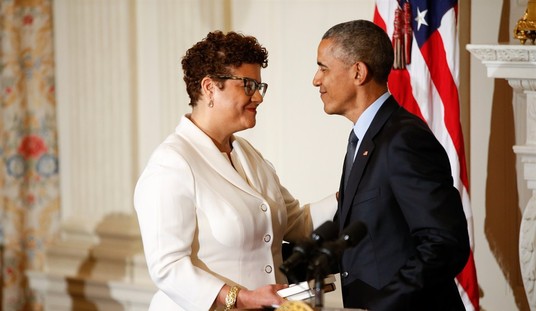Just a little late-night reminder that Trump’s probably getting reelected next year.
Also: Yes, it is strange that a post about reparations is adorned with the photo of a pretend Native American, but the fact is that Warren’s support for the idea is the biggest news about it to come out of the primary campaign thus far.
In 2014, notes HuffPost, Democrats opposed reparations by a margin of roughly two to one. Today, when Americans are asked whether the country should or should not make cash payments to black Americans who are descendants of slaves, they split differently:

I flagged a few other polls on reparations from the past five years in this post. Until recently it wasn’t unusual to find 65-70 percent of Americans opposed. The floor now appears to be higher, although opposition across the entire public remains lopsided and not just from whites. Hispanics are at 18/48 on the issue in HuffPost’s survey. But supporters of the idea have made inroads with numerous groups, most notably Dems but to a lesser extent Republicans. Five years ago just four percent of GOPers supported the idea, today 13 percent do.
There’s growing “wokeness” about related issues of racial discrimination as well:
The HuffPost/YouGov poll also shows a stark increase in the share of Democrats who acknowledge systemic barriers to equality. In a 2014 YouGov poll, 32% of Democrats said the impact of slavery had a major impact in black Americans’ lower average wealth levels today; in a 2019 survey, a 53% majority said the same. In 2014, 54% said discrimination was a major factor in that disparity; in the most recent survey, that number is up to 68%. Republicans and independents have also moved in the same direction, albeit far less dramatically.
Democrats are more likely now than they were five years ago to say that black Americans currently face discrimination when buying a house, trying to take out a loan, dealing with the police and getting a quality education, the poll finds.
Democrats realize that a full-bore push for reparations right now would end in political disaster, just as a full-bore push for single-payer in 2010 would have ended in the demise of health-care reform. They’re smart about taking half-measures in the near term to make the public comfortable with the idea of more ambitious proposals longer term. (Younger voters are more open to reparations than their elders, another reason to play the long game.) The idea floating around the House at the moment is simply to have Congress form a commission to study the issue. When Republicans end up attacking that as a crucial first step towards wealth transfers, proponents can say, “Nonsense. Weighing the pros and cons of major policy suggestions is a basic legislative function. No harm in looking at the merits.” Turns out the public is leery even of forming a commission but less so than they are about reparations themselves:

Democrats are better than two to one in favor. Various Senate Dems have already endorsed a bill in the House that would create a commission and Cory Booker is promising to introduce his own bill in the Senate. We’re not going to have a debate next fall about paying reparations but we are going to have a debate about whether Congress should deputize a group of people to examine it. Picture Trump in the Rust Belt warning working-class whites who can’t find jobs that Democrats want to raise their taxes to compensate the descendants of slaves.
Here’s an interesting result, though. Most of the questions about racial discrimination — in housing, obtaining loans, education, etc — show the public more likely to say that those problems are in the past than that they’re problems that blacks face now. But there’s an exception.

A clear majority of 55 percent overall say that discrimination against blacks by cops and the justice system is a problem today, not in the past, and there’s substantial bipartisan agreement. Fifty percent of independents and 31 percent of Republicans concur that it’s a current problem. You can see why Trump’s criminal justice reform bill found a constituency.
Here’s CNN reporting on Joe Biden’s latest political headache. Exit question: How much of the rise in support for reparations is a reaction to Trump? Polls show that public opinion on abortion sometimes shifts a bit to the left when a Republican’s in office and a bit to the right when a Democrat’s in charge, possibly because “leaners” in the middle find the president’s views on the subject a bit too extreme for them either way. It may be that Trump’s populism and brand of “white identity politics” has alienated some left-leaners and made them momentarily more receptive to compensating the descendants of slaves — with that support set to shrink once he’s been replaced by a Democrat or more traditional Republican.








Join the conversation as a VIP Member